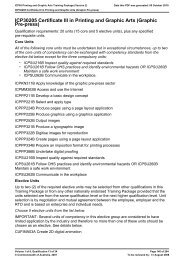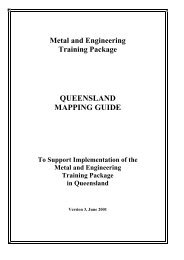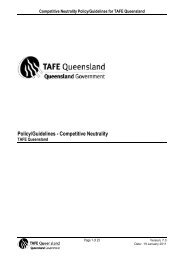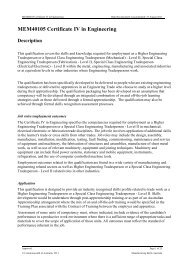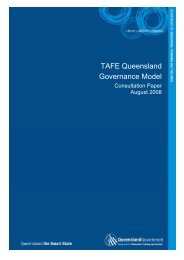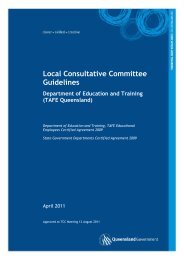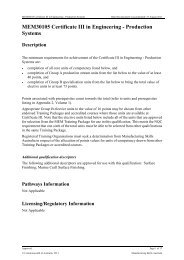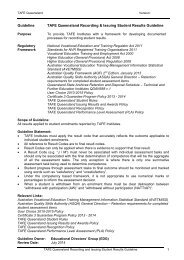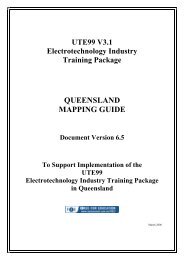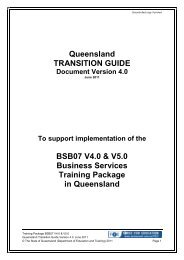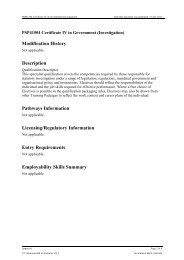The Crux of the Matter - Training Queensland - Queensland ...
The Crux of the Matter - Training Queensland - Queensland ...
The Crux of the Matter - Training Queensland - Queensland ...
Create successful ePaper yourself
Turn your PDF publications into a flip-book with our unique Google optimized e-Paper software.
Introduction<br />
Since 1998, LLN content has been ‘built-in’ to all<br />
<strong>Training</strong> Packages and accredited course content<br />
and has become an integral part <strong>of</strong> all vocational<br />
qualifications within <strong>the</strong> Australian Qualifications<br />
Framework (AQF). Each state and territory also<br />
has stand-alone accredited LLN courses that are<br />
delivered as part <strong>of</strong> adult general education.<br />
To develop <strong>the</strong> appropriate workplace<br />
communication and employability skills <strong>of</strong> all<br />
learners across all AQF qualifications it is essential<br />
that you ensure LLN is not seen as an issue just for<br />
learners with low-level skills.<br />
Whilst some learners will have more trouble<br />
developing LLN skills than o<strong>the</strong>rs and may require<br />
specific assistance, LLN is an issue across <strong>the</strong> board<br />
for all learners as LLN skills underpin <strong>the</strong> way we<br />
communicate and learn. As a result, LLN are now<br />
seen as both an issue <strong>of</strong> equity and <strong>of</strong> quality, and<br />
<strong>the</strong>refore relevant to all AQTF standards.<br />
LLN in VET<br />
In <strong>the</strong> past, LLN issues in vocational training were<br />
seen as an ‘equity only’ issue, and not critical<br />
to vocational training. Learners who had such<br />
difficulties were labelled as having a ‘deficit’ and<br />
lacking <strong>the</strong> ability to ‘cut it’ in training. National and<br />
international studies and decades <strong>of</strong> research and<br />
practice have shown this is simply not true.<br />
<strong>The</strong> crux <strong>of</strong> <strong>the</strong> matter is that speaking and listening,<br />
reading and writing and using numbers in a variety<br />
<strong>of</strong> practical ways underpins workplace skills. For all<br />
learners, LLN are key underpinning skills that will<br />
support <strong>the</strong>ir vocational learning, <strong>the</strong> development<br />
<strong>of</strong> <strong>the</strong>ir employability skills and <strong>the</strong>ir workplace<br />
communication skills whatever level <strong>of</strong> course or<br />
training <strong>the</strong>y are doing.<br />
Research by state and national vocational training<br />
bodies indicates that any LLN associated with<br />
vocational training is best delivered within <strong>the</strong><br />
context <strong>of</strong> that training wherever possible. This is<br />
because all vocational learners will be developing<br />
LLN skills as <strong>the</strong>y take on vocational competence.<br />
Attention to LLN issues is not just <strong>the</strong> responsibility<br />
<strong>of</strong> a few specialist teachers. <strong>The</strong> risk in this approach<br />
is <strong>of</strong> failing to reach all learners needing assistance.<br />
To manage this, all staff dealing with training and<br />
assessment require knowledge about vocational<br />
LLN.<br />
Taking a holistic approach to LLN can assist high<br />
competency completion rates, learner engagement<br />
and employer satisfaction. This means providing<br />
policies and procedures that deal with LLN from<br />
both an access and equity perspective and from<br />
an integrated skills perspective. Overall, a holistic<br />
approach allows quality training and assessment<br />
services to be delivered that fully comply with <strong>the</strong><br />
AQTF.<br />
5





